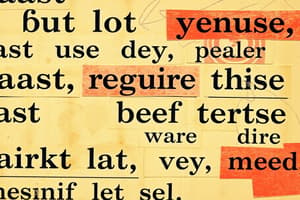Podcast
Questions and Answers
What do we use to say we have a good relationship with someone?
What do we use to say we have a good relationship with someone?
- Get along
- Get on
- Both A and B (correct)
- None of the above
What do we say when we want to suggest doing something?
What do we say when we want to suggest doing something?
Let's...
The past tense should be used when referring to grandparents who are not alive today.
The past tense should be used when referring to grandparents who are not alive today.
True (A)
To make an invitation sound more polite, we usually ask someone 'Would you like to ___?'
To make an invitation sound more polite, we usually ask someone 'Would you like to ___?'
How do we show possession by names?
How do we show possession by names?
Which form do we use for plural nouns that end in 's'?
Which form do we use for plural nouns that end in 's'?
What greeting do we use with friends?
What greeting do we use with friends?
Match the following terms with their definitions:
Match the following terms with their definitions:
We use 'less' with countable nouns.
We use 'less' with countable nouns.
When do we use 'should'?
When do we use 'should'?
How do we express an action in the past?
How do we express an action in the past?
Flashcards
Get Along/Get On
Get Along/Get On
To have a good relationship with someone. Used for both individual and group relationships.
Each Other
Each Other
Used when describing reciprocal actions between two people.
One Another
One Another
Used when describing reciprocal actions involving more than two people.
Past Tense
Past Tense
Signup and view all the flashcards
Let's
Let's
Signup and view all the flashcards
How About...
How About...
Signup and view all the flashcards
Plural Nouns Ending in "s"
Plural Nouns Ending in "s"
Signup and view all the flashcards
Plural Nouns Not Ending in "s"
Plural Nouns Not Ending in "s"
Signup and view all the flashcards
Possession with People's Names
Possession with People's Names
Signup and view all the flashcards
Plural Names' Possession
Plural Names' Possession
Signup and view all the flashcards
Superlatives
Superlatives
Signup and view all the flashcards
Study Notes
Getting Along
- "Get along" and "get on" are used to indicate having a good relationship with someone.
- "One another" is used for reciprocal actions involving more than two people.
- "Each other" is used for reciprocal actions between two people or things.
Past Tense
- Use the past tense to discuss what happened when a grandparent is deceased.
Suggesting Plans
- "Let's" is used to suggest an activity.
- "How about...?" is used to suggest a plan or idea.
- Use the "-ing" form of the verb after "How about...?" if no pronoun is used.
- "Would you like to..." is a polite way to extend an invitation.
Possession
- For plural nouns ending in "s", add an apostrophe after the "s" to show possession (e.g., "dogs'").
- For plural nouns not ending in "s", add an apostrophe and "s" to show possession (e.g., "children's").
Greetings
- "How's it going?" is a casual greeting used with friends.
- A formal greeting is not mentioned in the text.
Funny
- A funny person has a good sense of humor and makes others laugh.
Comparatives
- Use "than" when comparing two things.
- For one- syllable adjectives, add "-er" + "than".
- For adjectives with more than one syllable, use "more" + adjective + "than".
- Double the last consonant of a one-syllable adjective ending in "c + v + c" when adding "-er".
Less and Fewer
- Use "less" for nouns that can't be counted.
- Use "fewer" for nouns that can be counted.
- Use "more" for both countable and uncountable nouns.
Get Back
- "Get back" means to return to a place.
Time Expressions
- The text does not discuss the use of "in," "on," and "at" with time expressions.
Possession with Names
- For singular names, add "'s" to show possession.
- For plural names, add only an apostrophe after the "s".
Fancy
- The text does not discuss the use of the word "fancy".
Two Verbs Together
- The text does not provide a tip for using two verbs together.
Superlatives
- Use superlative forms (e.g., "biggest," "best") to compare something to a larger group.
Get Out
- "Get out" can mean to exit a vehicle, leave a place, or express disbelief.
Present Simple
- Use "do/does" for questions in the present simple.
- Third-person singular verbs in the present simple change to include "-s".
- Adverbs of frequency are placed after "to be" or before the main verb.
Go On
- "Go on" means to continue, happen, or proceed.
Romantic Relationships
- The text does not mention a specific phrase for being in a romantic relationship.
Break Up
- "Break up" means to end a romantic relationship.
Break Up and Get Back Together
- The text does not discuss the concepts of "break up" and "get back together".
Possession with Places
- Add "'s" to singular nouns (e.g., "dentist's") to show possession of a place.
- Use "'s" to indicate a place belongs to or is associated with a profession.
Possession with People's Names
- Add "'s" to indicate possession of a place by a person.
- Add only an apostrophe to plural names to show possession.
Past Action and State of Being
- The text does not specify how to express an action in the past or a state of being.
Should
- Use "should" to make deductions, express expectations, or indicate obligation in a negative way.
Have To
- Use "have to" to express various kinds of obligation.
Must
- Use "must" to express a personal obligation in the present tense.
- "Must" can also express prohibitions.
Studying That Suits You
Use AI to generate personalized quizzes and flashcards to suit your learning preferences.




